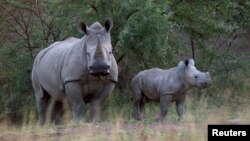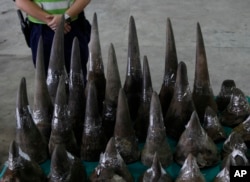JOHANNESBURG —
The fourth annual World Rhino Day is Sunday, with events planned everywhere from Australia to Zimbabwe. But in South Africa, the celebration is bittersweet. This nation is home to 75 percent of the world’s rhino population -- estimated at about 25,000 --, but has seen more than 600 of these majestic beasts killed this year so far. Wildlife group WWF says it fears things may get even worse.
The rhinoceros faces constant danger from poachers in South Africa. If the pace of rhino killings continues, South Africa’s death toll could surpass last year’s record slaughter of 668 animals.
The threat is from increasingly sophisticated and heavily armed poachers and criminal syndicates who are feeding a growing appetite for rhino horn in Asia -- where it is widely believed to have medical benefits.
Those alleged benefits have been largely disproven by scientific research. But that hasn’t stopped Asian consumers from snapping up the rare product at the whopping price of $65,000 a kilogram.
South African officials have put up a multi-front fight against poaching, but activists are increasingly dismayed that that it is having little effect on the illicit trade.
Jo Shaw is the rhino coordinator for the World Wildlife Fund South Africa.
“Well, we are sitting in a very concerning situation here in South Africa, which is home to three in four of all the rhinos alive today, but is losing more than two rhinos a day to poaching for their horns. It seems that we could even surpass the 2012 figure by the end of September, or even by World Rhino Day itself, and perhaps reach 900, or even 1,000 animals for 2013 in total,” said Shaw.
WWF is taking its fight to Twitter, asking for 1 million tweets tagged #Iam4rhinos. That’s four, as in the number. The conservation group hopes that the Twitter attention will bring global awareness to the plight of rhinos.
Kirsty Brebner, Rhino Project Manager for the South Africa-based Endangered Wildlife Trust, said that not only have rhinos been around longer than modern humans -- their fate improved our own.
“Well, for starters rhinos have been around for about 8 million years. So they’ve survived all sorts of environmental catastrophes, which have wiped out other species. And it’s a real bad indictment on us if we lost them on our watch after that period of time. They also play a very valuable ecological role in the environment in which they live, and they also, as one of the Big Five, they are a big source of tourism. They’re a big attraction for tourists to come to South Africa, and of course that brings in revenue and that brings in jobs,” said Brebner.
Shaw urged everyone around the world to think of the plight of the rhino.
“I think in five or ten years’ time we’ll look back on 2013 as being a critical time for the future of rhinos globally, and September the 22nd to give everybody the opportunity to say, ‘I am for rhinos’ and to call for everyone around the world to support their future,” said Shaw.
The rhinoceros faces constant danger from poachers in South Africa. If the pace of rhino killings continues, South Africa’s death toll could surpass last year’s record slaughter of 668 animals.
The threat is from increasingly sophisticated and heavily armed poachers and criminal syndicates who are feeding a growing appetite for rhino horn in Asia -- where it is widely believed to have medical benefits.
Those alleged benefits have been largely disproven by scientific research. But that hasn’t stopped Asian consumers from snapping up the rare product at the whopping price of $65,000 a kilogram.
South African officials have put up a multi-front fight against poaching, but activists are increasingly dismayed that that it is having little effect on the illicit trade.
Jo Shaw is the rhino coordinator for the World Wildlife Fund South Africa.
“Well, we are sitting in a very concerning situation here in South Africa, which is home to three in four of all the rhinos alive today, but is losing more than two rhinos a day to poaching for their horns. It seems that we could even surpass the 2012 figure by the end of September, or even by World Rhino Day itself, and perhaps reach 900, or even 1,000 animals for 2013 in total,” said Shaw.
WWF is taking its fight to Twitter, asking for 1 million tweets tagged #Iam4rhinos. That’s four, as in the number. The conservation group hopes that the Twitter attention will bring global awareness to the plight of rhinos.
Kirsty Brebner, Rhino Project Manager for the South Africa-based Endangered Wildlife Trust, said that not only have rhinos been around longer than modern humans -- their fate improved our own.
“Well, for starters rhinos have been around for about 8 million years. So they’ve survived all sorts of environmental catastrophes, which have wiped out other species. And it’s a real bad indictment on us if we lost them on our watch after that period of time. They also play a very valuable ecological role in the environment in which they live, and they also, as one of the Big Five, they are a big source of tourism. They’re a big attraction for tourists to come to South Africa, and of course that brings in revenue and that brings in jobs,” said Brebner.
Shaw urged everyone around the world to think of the plight of the rhino.
“I think in five or ten years’ time we’ll look back on 2013 as being a critical time for the future of rhinos globally, and September the 22nd to give everybody the opportunity to say, ‘I am for rhinos’ and to call for everyone around the world to support their future,” said Shaw.







